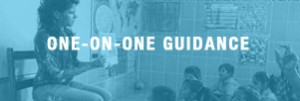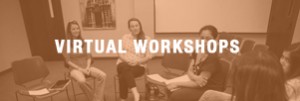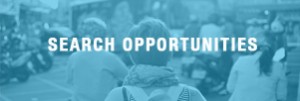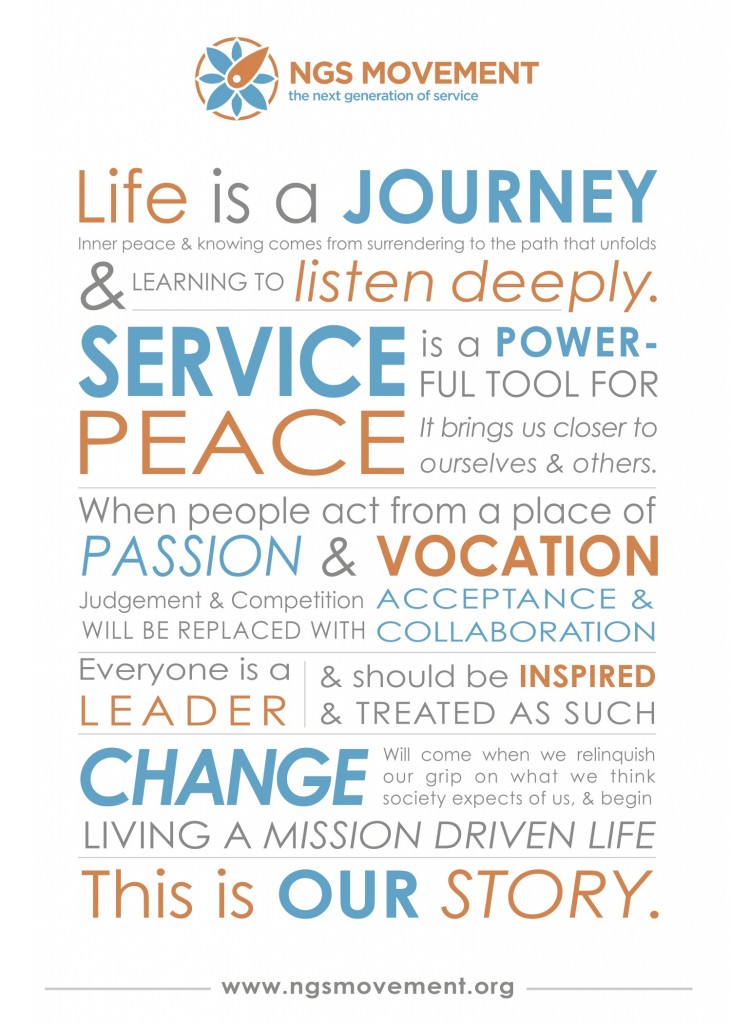Career Center Rebel- Journey of an Unconventional Engineer Part 1
Career Center Rebel is a guest blog series written by Erica Spiritos, a Soul Searcher and Idealist. Erica is bold and silly and in 2011 she started her journey to uncover her passion and place in the world as an unconventional engineer. We are re-posting pieces of her journey for other recent grads that can relate. Views expressed in these posts belong to Erica and may not reflect the views of the NGS Movement.
Post Numero Uno: The Cause
Originally written on Sunday, November 28, 2010
I am on a mission to do something TOTALLY AWESOME after I graduate: to explore my passions, to travel, to be inspired, to reflect on what is important to me, and to learn in a non-academic, non-corporate setting. I want to work on meaningful projects with motivated people, and I want to wake up in the morning every day and feel that my work has a purpose, and that I am part of a larger, global effort to affect positive change in this world.
That said, I am just beginning to scratch the surface in uncovering what possibilities exist, or what kinds of experiences I might be able to create for myself! So, I plan to use this blog as a record of my personal quest to seek out those opportunities, and I invite you to come along for the ride! Hopefully, if you are on a similar mission, we can take on this search together – I’ll post my thoughts, and I would love to hear yours. ![]()
A little bit about me:
As a senior in high school, I read a Wired magazine interview with a man named Larry Brilliant that changed the course of my academic career. At the time, Brilliant had just been appointed the director of Google’s philanthropic branch, Google.org (after having spent the early years of his career working to eradicate smallpox and polio in India), and declared in the interview that engineers were the best source for solutions to the world’s biggest problems. So at 17, I decided that I was going to be an engineer and change the world.
As a student at Carnegie Mellon, I sought out opportunities to do this type of work through an organization called Engineers Without Borders that works with communities in developing countries on small-scale water, sanitation, energy, and construction projects. And in May, I will graduate with a degree in Civil and Environmental Engineering. My college career has provided me with opportunities to explore my interests through research, through travel, and through meaningful discussion, and I truly feel that after four years I will have acquired a concrete set of analytical and technical skills that I can take with me wherever I go. I will admit, though, that it is not my fondness for fluid mechanics that has kept me on this path for nearly four years.
Instead, I am fueled by the fact that nearly 1 billion people on this planet lack access to clean water; that 2.5 billion lack access to sanitation; that children in developing countries across the globe are not in school; that we are cutting down trees more rapidly than we are planting new ones; and that we are consuming the earth’s resources at unsustainable levels. I get excited about straws that filter river water, and merry-go-rounds that generate electricity. I jump at the mention of bamboo schools and urban farming.
I love interacting with people – I find that my level of happiness at the end of the day is a function of how much time I can spend engaging in interesting conversation, cooking dinner with friends, and collaborating with other students (and not staring at a computer screen).
I love nature, and playing (biking, running, hiking, skiing, star-gazing) in the mountains. I spent a summer and the second semester of my junior year in Bozeman, Montana, and fell in love with the lifestyle and culture that is so intrinsically rooted in the natural environment.
I’m also an idealist. I view the world from a place of opportunity for a more equitable, more respectful, and more peaceful future, and I want to be a part of this movement for real change.
No, I am not the same girl I was when I ripped out the Brilliant interview and pinned it above my bed. But at 21, I am just as eager as I was at 17.
And so it is with this mission that I take the plunge into the unstructured and uncertain world of infinite possibility upon graduation. I don’t intend to sit in a cubicle and work for The Man, and so the search for a high-impact, global, socially and environmentally-conscious, potentially technical opportunity for next year begins…
NOW,
Germination
Regionally written on Tuesday, November 30, 2010
A few weeks ago, I was brainstorming ideas for how to make the CMU Engineers Without Borders website more useful to our members. It occurred to me that it might be helpful to compile a running list of resources for students who are not interested in working for an engineering firm during the summer, or after graduation, and instead want to work for a non-profit organization, or for a start-up company – for a cause that means something to them. This list would include (but would not be limited to) organizations similar to EWB (non-profits, start-ups, etc.) that focus on sustainable international development; Carnegie Mellon faculty and alumni who are doing this kind of work; relevant books, websites, TED talks (I’m addicted), Nicholas Kristof columns (I heart him); and fellowship/scholarship opportunities for service-oriented engineers.
In discussing this idea with some friends, it dawned on me that this list might be a valuable resource for many students, and not just members of EWB. Perhaps there is a real need for an alternative career center (at Carnegie Mellon, and at other universities) that would provide a supportive environment for students who seek an unconventional career path, or want to try something different before settling into more stable employment. Well this was kind of a crazy thought, but it stuck with me, so I decided to engage the Career Center at CMU to see if there was a mutual interest in exploring this idea further.
Turns out, there was! Farouk, the Director of the Career Center, immediately took to the idea. He understood that for such a cutting-edge and interdisciplinary university, we could do more to help students reflect on their priorities and come up with out-of-the-box opportunities for employment. The initiative is still very free form right now, but the point is that times are changing. The idea of a career is quickly becoming outdated: less people are working for the same company for 40 years, and more are hopping around from one opportunity to the next as their own interests and needs evolve. Now, with the Internet and globalization, there is literally a world of opportunity available to us, and our generation has the opportunity to break the mold and pursue a different kind of career that is more in tune with the rapidly changing environment in which we live.
So, what do you think? What’s the next step? How should this alternative career center operate, and what should be its purpose? How can we show students that it’s okay to do something a little on the edge, and provide resources and networks for us to tap into that will propel us forward on this path?
Searching the Innernet
Originally written on Thursday, December 2, 2010
I think I realized why all of my googling for jobs has been largely unsuccessful. What I’m looking for may very well be out there (and it might not) but the point is that, for the time being, I’m looking in the wrong places.
Today I met with Farouk, the Director of the Career Center, to discuss my personal quest to figure out what to do after I graduate. (I don’t really have a name for this search… any ideas? I don’t want to call it a job search because that title seems too rigidly defined). Anyway, I was anticipating the typical routine of sorting through opportunities to apply for, and instead I was greeted with something totally different…
After inquiring about my life story, why I decided to come to Carnegie Mellon (a question I love to answer because there are very distinct reasons why this university appealed to me), and how I came to major in engineering, Farouk posed the following question: “What gets you exited? What do you LOVE to do?”
While this appears to be a very simple question, it was really difficult for me to answer (which made me sort of sad). Interestingly enough, the first thing that popped into my head was yoga. (I actually said out loud that I love yoga). I think this response was natural partially because practicing yoga helps me to feel grounded at a time in my life when I’m so busy doing, rather than being. But more than that, I love the physical and spiritual journey of the practice, and the fact that I can feel so rejuvenated and recharged and refreshed when I roll up my mat at the end of class. In retrospect, I’m not actually sure if this response even answers the question, but it was honest, and it was a reflection of me.
So then I said that I love leading our chapter of Engineers Without Borders, and developing the identity of such a young organization (our chapter was founded during my freshman year). And then from there, I felt myself becoming more and more vague and abstract: I rambled on about how I really enjoy brainstorming and generating ideas, and how I love making connections between people and thoughts and organizations. (As a side note, I also have this fantasy of opening up my own breakfast restaurant called Da me un panqueque in which diners would eat at communal tables, and pick from our garden fruit for their pancakes and vegetables for their eggs.)
So then Farouk asked me: “What things about the world, or society, would you like to change? What angers you?” I think my answer to this question would have been different if we had had this conversation on any other day, but I had just read this NY Times column by Thomas Friedman and so I said that I was angered by the lack of collaboration (and tendency toward competition) in America, and also by the fact that so many people seem to approach problem-solving from a place of limitation and constraint, rather than from a place of possibility. I could describe more precisely what I meant by this, but that isn’t really the point. I could have talked about any number of things: water insecurity and the fact that nearly one out of every seven people on this planet lack reliable access to clean drinking water; the agricultural crisis in America that has made corn an ingredient in almost three-quarters of all products found in the supermarket and has linked poverty with obesity; the fact that our education system is crushing creativity by measuring students against a standard of what we think will produce bright leaders of the future…. You get the idea.
And then, here’s the big one: “How can you channel those things that you love and that excite you, to change something that angers you?” I was so taken-aback by this question – because it articulated perfectly what I’ve subconsciously been aiming for in my job search (for lack of a better name) – that I just sat there and smiled. So Farouk rephrased: “What role do you want to play in the world?” Not what job do you want to have, but what role do you want to play? I confessed that I was stuck in the status quo of traditional job titles, and so he removed those constraints and asked, “If you were a member of a tribe, a million years ago, what role would you play in that society?” I still did not have an answer to this question, but I couldn’t be upset about this because I felt that I had finally come upon the right question to be asking in this process!!
Brad said it really well in the comment he made to my last post, and my friend Anna said it again: we are searching for the WHAT (what we love to do, what excites us) and the WHY (the cause that we are fighting for, the change we want to see in the world). We want to love not only the kind of work we are doing, but also the reason that we are doing it.
I left the meeting with the feeling that I had made huge progress. No, I did not come away with more things to apply for, or even with a sense that I knew what I wanted to do with my life. But I realized that before searching externally, I would need to search internally. Planning the next chapter of life after college is a personal journey – and the best place to start looking is within.
To FE, or not to FE?
Originally written on Monday, December 6, 2010
As brief introduction, I wrote this post about a week ago, and I never posted it because I wasn’t sure if I felt it would be useful to people who aren’t civil engineers. But I think I’m also stuck on a larger issue: If I’m not sure what I want to do, is it a good idea to pursue a certain path “just in case?” Let me know what you think…
Here is my conundrum: Should I, or should I not take the Fundamentals of Engineering (F.E.) Exam this April? And more importantly, is it critical that I become a Professional Engineer?
In the field of Civil Engineering, one must be a registered Professional Engineer (P.E.) in order to stamp the requisite seal of approval on any and all design specification documents. And, there is no denying that – as in any professional title – being able to add “P.E.” after your name indicates to the world your credibility in the field. Indeed, those two capitalized letters scream, “I know my sh*t.”
To become a Professional Engineer, one must first take and pass the F.E. Exam (8, yes EIGHT, hours long), at which point he or she is considered an Engineer in Training. The EIT must then work under a Professional Engineer for 5 years before taking the Professional Engineering Exam, and registering as a PE in their U.S. state(s) of employment.
So, I’m wondering if it would be beneficial for me to become a Professional Engineer. Is this a useful credential to have even if I plan to work predominantly outside of the US? Is it worth it for me to pursue a conventional career at an engineering firm for 5 years so to gain the credibility that might be necessary to have a real impact in the field of sustainable development later on in my life? Am I willing to sacrifice my desire to work on projects I really care about – in a less structured setting – during a time in my life when I am not tied down by financial responsibilities?
And, dare I ask: what if I don’t know what I want to do now, let alone in the future? What if I’m not sure I want to be an engineer?
Running Into Myself: Engineer Meets Soul
Originally written on Friday, December 10, 2010
You know that feeling that you get when you’re talking about something that you really care about? When you’re energy level shoots to 10, and you can feel your cheeks tighten from smiling so much? When the person you are talking to is getting excited just because of how excited you are? In those moments, the words seem to flow organically. I don’t have to think so hard about what I’m saying. I’m not worried about how I am perceived, or whether I’m right or wrong – I am connected to myself. I had one of those experiences this week, and I think I have a hunch as to why it happened.
The other day, I was running in Frick Park, and the snow-covered trails reminded me of Montana. As a small speck amidst the vastness of the mountains, you can’t help but surrender, and have faith in the journey. Away from the frenetic pace of the city, the quiet, calmness of my natural surroundings allowed me to search “my innernet”: to hear the totality of my inner voice, to acknowledge my feelings and reflect on what is important to me. It’s funny how sometimes, when you stop thinking and start feeling, when you stop doing and start listening, when you stop worrying and start trusting, when you turn inward for guidance instead of outward… the answers just sort of come to you.
So this week, when I was in Farouk’s office, I just started talking and I felt myself getting excited. I had been grappling with this question of how I might be able to do the things I love to do while working for a cause I believe in. And I realized that once I stopped thinking about what people might expect of me, or what I may expect from myself as a means of conforming to those societal expectations, I began to realize that I really do know what I love to do, and what I care about.
I love working at the intersection between sustainable technology, and community need – figuring out how to implement development projects that are culturally sensitive, and appropriate for the community. I heard the following story at an EWB conference, and I think it illustrates this idea perfectly…
One of the very first projects that an EWB chapter worked on after the organization was established involved a water distribution system in an African village. The motivation behind the project was that the women spent hours each day walking to fetch water from a source several miles away, which prevented them from doing other things in the village that might allow them to generate an income for their families. So the project team brought the water to the people so that women need only walk to a village tap a short distance from their homes in order to get water. A year later when the team returned to evaluate the success of the project, they found a rusted tap that the women had broken intentionally. They learned that, although the water was more accessible, the women missed the time they spent together walking to collect water for their families. It was the one time during the day when they could escape from their husbands and children, and talk about girl things.
I want to develop relationships with people and families. I want to ensure that the projects we are implementing are environmentally, economically, and socially sustainable, and that they are designed in partnership with the community. I’ve come to realize that the most effective, sustainable change will come from the men and women of the community, and not from a foreigner. And so I think the best thing I can do is to help lift people (who spend their days worrying about whether they will have enough food and water to survive the night, and do not have the freedom to think about the future) up onto the first rung of the ladder out of poverty, so that they can begin climbing on their own. At the Clinton Global Initiative University conference that I went to in Austin, Texas, Bill Clinton phrased it beautifully: We want to work ourselves out of a job. Yep, that’s what I want to do.
So… what does this kind of community development look like? What skills will I need to develop in order to play this role? What resources will be useful to me? Hopefully, if I continue to listen, and trust, and be – if I actively practice running into myself throughout my life as I grow and change and learn – I will stumble upon opportunities that will allow me to “collect” these skills and resources.





